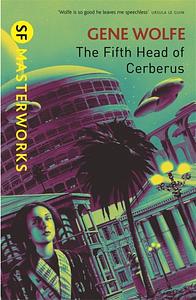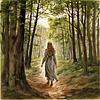Take a photo of a barcode or cover
adventurous
challenging
mysterious
slow-paced
Plot or Character Driven:
A mix
Strong character development:
No
Loveable characters:
Yes
Diverse cast of characters:
Complicated
Flaws of characters a main focus:
Complicated
Avoid the introduction of the SF Masterworks edition– it does that thing where it spoils everything noteworthy about the book.
This is an interesting collection of loosely connected novellas. There’s lots of deep subtext here, about colonialism, about what it means to be human, but I’m not sure the entire thing meshes into a coherent narrative, and despite the short length I found parts the 2nd and 3rd novellas a bit of a slog. The first novella is by far the best of the bunch, and it and the 3rd have very well done twists.
This is an interesting collection of loosely connected novellas. There’s lots of deep subtext here, about colonialism, about what it means to be human, but I’m not sure the entire thing meshes into a coherent narrative, and despite the short length I found parts the 2nd and 3rd novellas a bit of a slog. The first novella is by far the best of the bunch, and it and the 3rd have very well done twists.
I have enough trust in Gene Wolfe to power through some parts that I don't like, because it's often recontextualized later - the second novella is like that - if you're struggling with it after the great first novella, the third will make the second worth it. A brilliant book that requires reading between the lines.
“Reread. It's better the second time. It will be even better the third time. And anyway, the books will subtly reshape themselves while you are away from them. ‘Peace’ really was a gentle Midwestern memoir the first time I read it. It only became a horror novel on the second or the third reading.” — Neil Gaiman, How to Read Gene Wolfe
challenging
dark
inspiring
mysterious
reflective
medium-paced
Plot or Character Driven:
A mix
Strong character development:
Complicated
Loveable characters:
Complicated
Diverse cast of characters:
Complicated
Flaws of characters a main focus:
Complicated
Gene Wolfe's The Fifth head of Cerberus seems to be regarded by his aficionados his first 'proper' novel, and he himself dismissed the preceding Operation Ares as a piece of juvenilia. My love affair with Wolfe has been largely confined to his Solar cycle, which consists of three linked, major novel series, so I read his 'ground zero' book with a great deal of interest. The Wolfe I know seems already to be fully-formed here, and although his worldbuilding in this book is far more proximate to our own era than in the other work I know, it is very similar—Byzantine social structures, uncanny pairings of the familiar and the alien, and a murky deconstruction of SF's favourite formula, time = progress.
The book is presented as a collection of three linked novellas. It's clear by the time you've finished that it is a single novel, designed and constructed as such, however. What appears to be true in one (if anything) is called into question by the other two. The work as a whole is a tissue of ambiguities and intimations. There is, in fact, at least one clear and plausible explanation for the apparent contradictions between the three stories, but nothing here is ever certain. I don't think that Wolfe ever set out to confuse his readers—but he himself enjoyed exploring possibilities, and he never forecloses on such explorations for his audience.
All three novels are set on a pair (Wolfe loves doubling) of extraterrestrial colonies, originally French, but now English speaking. Their cultures are not high-tech, or socially progressive, but seem more reminiscent of nineteenth century Europe than of any traditional SF future. These colonies may or may not have had native inhabitants, some of whom may or may not represent an earlier wave of human migration. Some or all of the characters may in fact be (or not be) members of those aboriginal populations. Three contrasting stories are presented: a Proustian first-person narration, an anthropological rendering of a folk tale, and a fragmentary Kafka-esque account of a mysterious judicial process. Taken together, illuminating one another, they present a number of possibilities.
The pleasure of this book, and I found it an enormous pleasure to read, is in teasing apart some of those possibilities, but remaining aware that others persist, and that there may be no single key interpretation that unlocks the puzzle box. The three stories relate to one another in multiple, complex ways, some of which are apparent immediately, others of which become so only after the reader has given it some thought. All of it is presented in the most beautiful, carefully crafted prose, differentiated perfectly for the purposes of telling each tale in its own language. He'd been writing for a good while before this was published, but still, for an early career novel, this is an astonishingly accomplished example of the novelist's art.
The book is presented as a collection of three linked novellas. It's clear by the time you've finished that it is a single novel, designed and constructed as such, however. What appears to be true in one (if anything) is called into question by the other two. The work as a whole is a tissue of ambiguities and intimations. There is, in fact, at least one clear and plausible explanation for the apparent contradictions between the three stories, but nothing here is ever certain. I don't think that Wolfe ever set out to confuse his readers—but he himself enjoyed exploring possibilities, and he never forecloses on such explorations for his audience.
All three novels are set on a pair (Wolfe loves doubling) of extraterrestrial colonies, originally French, but now English speaking. Their cultures are not high-tech, or socially progressive, but seem more reminiscent of nineteenth century Europe than of any traditional SF future. These colonies may or may not have had native inhabitants, some of whom may or may not represent an earlier wave of human migration. Some or all of the characters may in fact be (or not be) members of those aboriginal populations. Three contrasting stories are presented: a Proustian first-person narration, an anthropological rendering of a folk tale, and a fragmentary Kafka-esque account of a mysterious judicial process. Taken together, illuminating one another, they present a number of possibilities.
The pleasure of this book, and I found it an enormous pleasure to read, is in teasing apart some of those possibilities, but remaining aware that others persist, and that there may be no single key interpretation that unlocks the puzzle box. The three stories relate to one another in multiple, complex ways, some of which are apparent immediately, others of which become so only after the reader has given it some thought. All of it is presented in the most beautiful, carefully crafted prose, differentiated perfectly for the purposes of telling each tale in its own language. He'd been writing for a good while before this was published, but still, for an early career novel, this is an astonishingly accomplished example of the novelist's art.
challenging
dark
mysterious
slow-paced
Plot or Character Driven:
Plot
Strong character development:
No
Loveable characters:
No
Flaws of characters a main focus:
No
adventurous
challenging
mysterious
slow-paced
Plot or Character Driven:
A mix
Strong character development:
Complicated
Loveable characters:
Complicated
Diverse cast of characters:
Complicated
Flaws of characters a main focus:
Yes
dark
mysterious
medium-paced
Plot or Character Driven:
Character
challenging
mysterious
medium-paced
Plot or Character Driven:
Plot
Strong character development:
No
Loveable characters:
Complicated
Diverse cast of characters:
No
Flaws of characters a main focus:
No
Graphic: Animal death, Confinement, Death, Slavery, Blood, Colonisation
Minor: Sexual content
Cruel and strangely beautiful. The hypocrisy of the slave holding society matches what I’ve been reading about slavery in North America. The truly delicious stuff here though is the question of whether the boy is impersonating the anthropologist or rather if the aboriginal aliens 1. Exist 2. Have assimilated 3. Believe their own cover stories ; or just the opposite, that weird thing we see all the time all around us: the murderers believing that they themselves are the people they’ve murdered, passing. All those people hoping for a certain result in their DNA test... know what I mean? Like Johnny Depp as Tonto.





